Friedrich Schleiermacher Collection (6 vols.)
Digital Logos Edition
Overview
What is the foundation of liberal Protestantism? Wracked by doubt and challenged by questions raised by the Enlightenment, Friedrich Schleiermacher attempted to develop a system of theology that would free theology from shifts in philosophy. What he created was a theological system that replaced Scripture and the historical creeds with human experience and emotion. Schleiermacher, known as the Father of Liberal Theology, argued that the “essence of religion is the feeling of absolute dependence.” Jesus was unique, he said, because he was keenly aware of this utter dependence. It is the church’s job to live this utter dependence and communicate it with the world. The work of theology is to explore the experiences and feelings of living out this utter dependence. Theology, for Schleiermacher, should be descriptive, not prescriptive.
The Friedrich Schleiermacher Collection offers the core works of Schleiermacher’s theology. Jump to important and controversial passages using the powerful search tools in Logos Bible Software. Examine Kant’s influence on Schleiermacher’s theology by comparing them side by side. Important terms are linked with the rest of your library, so you can cross-reference with a click.
This title is included in the following collections
You can save when you purchase this product as part of a collection.
Modern Philosophy Research Lib...
$499.99$499.99Philosophy Research Library (1...
$799.99$799.99Logos 8 Lutheran Gold Legacy L...
$849.99$849.99Logos 8 Lutheran Platinum Lega...
$1,499.99$1,499.99
- $1,499.99
- $2,999.99
- $2,999.99
- $4,749.99$3,562.49
- $4,749.99
- $4,749.99
- $4,749.99
- $4,749.99
- $12,102.39$7,299.99
- $23,999.99$17,999.99
- $21,749.99
- $24,999.99

- Provides an introduction by the translators for each volume
- Includes in-depth indexes
- Offers a biographical sketch of Schleiermacher’s life
- Title: Friedrich Schleiermacher Collection
- Author: Friedrich Schleiermacher
- Volumes: 6
- Pages: 1,856
Individual Titles
- On Religion: Speeches to Its Cultured Despisers
- Christmas Eve: A Dialogue on the Celebration of Christmas
- Brief Outline of the Study of Theology
- The Theology of Schleiermacher: A Condensed Presentation of His Chief Work “The Christian Faith”
- Selected Sermons of Schleiermacher
- A Critical Essay on the Gospel of St. Luke
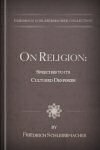
Schleiermacher wrote On Religion as a defense of the Christian faith against the challenges of Enlightenment philosophy. The book consists of five speeches in which Schleiermacher advances three ideas. He argues that humans are evolving and changing, that God’s work must be universal, and that piety is the emotional response of the finite’s dependence on the infinite.
If a book can signal the beginning of an era, then Schleiermacher’s On Religion: Speeches to its Cultured Despisers marks the beginning of the era of Protestant Liberal Theology.
—Jack Forstman, former dean emeritus, Vanderbilt Divinity School

Written as a Socratic-style dialogue, Christmas Eve recounts a number of conversations during a banquet held on Christmas Eve by a woman named Ernestine. Through discussions between the various characters, Schleiermacher communicates his views on theology and religion—particularly as they relate to the role of Christ. The people represented in the book are taken from the types of people Schleiermacher associated with—the educated, cultured section of society. These were the type of people Schleiermacher preached to and prayed with. It is thus representative of Schleiermacher’s liberal understanding of theology as descriptive of the experiences of the people in a religious community.
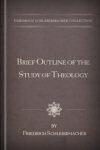
Written at the beginning of Schleiermacher’s professorship at the University of Berlin, Brief Outline of the Study of Theology seeks to lay out a structure for the study of theology, particularly in a university context. In it, Schleiermacher lays out what he sees as the nature of theology, the nature of the theological task, and the nature of the theologian. He then states the nature of philosophical theology, historical theology, and practical theology. Schleiermacher presents the structure of theology as a wheel. Each spoke is a different discipline that adds to the whole. The hub is the teaching and guidance of the church. The theologian must understand the important aspects of each spoke and how they relate to the hub.
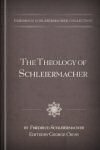
This work is a condensed version of Schleiermacher’s magnum opus The Christian Faith (Der christliche Glaube). Schleiermacher develops the central tenet of all his theology: religion is the feeling of absolute dependence on God. This feeling implies a direct relationship between the infinite and the finite. For Schleiermacher, the church is not a knowing thing or a doing thing; it is a feeling thing. Piety is the use of feeling as the basis for knowing and doing. Feeling is the essential element of human nature and the highest grade of immediate self-consciousness. Theology is a description of the experiences of the community. Dogma comes out from the community rather than being imposed on it.
No modern treatment of the questions raised by the religious life has surpassed it, or perhaps even equaled it, in respect to influence exercised on the course of religious thought.
—from the preface by George Cross
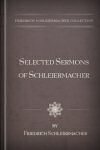
This book contains the following sermons:
- The Power of Prayer in Relation to Outward Circumstances
- The Dying Savior Our Example
- A Nation’s Duty in a War for Freedom
- Necessity of the New Birth
- Christ and the Unstable
- Forgiveness and Love
- On Marriage
- The Christian Training of Children
- Rejoicing Before God
- Love and Service
- God’s Restraining Power
- The Last Look at Life
- The Death of the Savior the End of All Sacrifices
- Christ’s Resurrection an Image of Our New Life
- Jesus Born the Son of God
- Christ Bringing a Sword
- The Savior’s Peace
- Why the Divine Invitation Is Refused
- Loved in the Beloved
- Thanksgiving after Chastisement
- God’s Love Magnified in Christ’s Death
- The Prayer of Stephen
- Provoking Each Other to Love and Good Works
- The Savior’s Last Hours
- The Parting Promises of the Savior
- True Harvest Joy
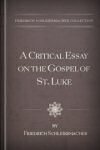
One of the first works of synoptic textual criticism, A Critical Essay on the Gospel of St. Luke explores the textual origins of Luke as it relates to the other synoptic Gospels. Schleiermacher, drawing somewhat on previous work, espouses the theory that the Gospel writers were not using each other as sources; rather, that there were independent sources, some of which they shared, some of which they didn’t.
Friedrich Schleiermacher (1768–1834) was born in Breslau, Silesia, Prussia. His father was a Reformed chaplain in the Prussian army. Schleiermacher attended a Moravian school and eventually went to the University of Halle. He graduated from Halle in 1794 and began to tutor the children of an aristocratic family. He left after two years and took up a chaplaincy at a hospital in Berlin. While in Berlin, Schleiermacher was influenced by the Romantic movement, particularly the emphasis on imagination and emotion. He read the works of Baruch Spinoza, Plato, Immanuel Kant, Fichte, and Schelling. In 1802 he became the pastor of a congregation in Stolp, Pomerania. He left in 1804 to accept a position as preacher and professor of theology at the University of Halle. In 1807, he accepted an offer to become pastor of Trinity Church in Berlin. While there, he helped found the University of Berlin and accepted a chair of theology. He also became the secretary of the Prussian Academy of Sciences. Schleiermacher’s advocacy of the unification of the Reformed and Lutheran branches of the German church led to the Prussian Union of Churches in 1817. Schleiermacher wrote his magnum opus, Der christliche Glaube nach den Grundsätzen der evangelischen Kirche (The Christian Faith according to the Principles of the Protestant Church), in 1821 and revised it in 1831.
Reviews
9 ratings
Jeffrey Tinoco
10/30/2023
The principal and magnum opus (The Christian Faith according to the Principles of the Protestant Church) is not included in this collection.
Charles Puskas
4/19/2015

Aaron
12/21/2013

Rev Dr Paul Blackham
12/14/2013
I always come back to the writings of Schleiermacher. His influence can be felt throughout the modern Protestant world, especially in popular evangelicalism. I just hope that Logos make The Christian Faith available soon.
David Leslie Bond
11/20/2013

Prayson Daniel
11/6/2013

Larry Proffitt (I
11/5/2013
John Kuvakas
8/1/2013

Bill Shewmaker
7/13/2013